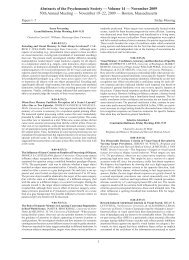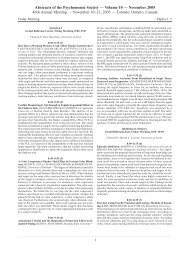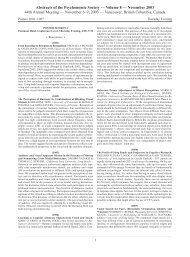S1 (FriAM 1-65) - The Psychonomic Society
S1 (FriAM 1-65) - The Psychonomic Society
S1 (FriAM 1-65) - The Psychonomic Society
You also want an ePaper? Increase the reach of your titles
YUMPU automatically turns print PDFs into web optimized ePapers that Google loves.
Saturday Noon Posters 4021–4027<br />
(4021)<br />
Neighbor Frequency Effects in English: Parallels With Lexical<br />
Ambiguity Resolution? TIMOTHY J. SLATTERY, KEITH RAYNER,<br />
& ALEXANDER POLLATSEK, University of Massachusetts,<br />
Amherst—Two eye movement experiments were conducted to investigate<br />
whether the processing of a word can be affected by the word’s<br />
higher frequency neighbor. In Experiment 1, target words with (birch)<br />
or without (spruce) higher frequency neighbors were embedded into<br />
two types of sentence frames: one in which the higher frequency<br />
neighbor (birth) could fit given the prior sentence context and one in<br />
which it could not. Experiment 2 used the same design with target<br />
words that were both neighbors and homonyms (beech, beach) to investigate<br />
the role of phonology. <strong>The</strong> results suggest that sentence context<br />
can affect the processing of word neighbors in much the same way<br />
it affects lexical ambiguity resolution. <strong>The</strong> separate meanings of a lexically<br />
ambiguous word, then, may be thought of as extreme forms of<br />
word neighbors (word roommates). Implications for models of word<br />
recognition and lexical ambiguity resolution will be discussed.<br />
• COGNITIVE CONTROL •<br />
(4022)<br />
Error Repetitions and Attention: Examination Within the Older<br />
Adults Group. ETSUKO T. HARADA, Hosei University, & SATORU<br />
SUTO, Chuo University—<strong>The</strong> phenomenon of error repetition—that<br />
elder users of IT-based equipment often show continual repetitions of<br />
the same erroneous operations in daily lives and the usability testing<br />
labs—was investigated with a simple kanji selection task, and we<br />
found that it was related to attention, especially the function of maintaining<br />
multiple goals in both age groups, younger and older adults<br />
(Harada & Suto, 2006). In this study, we examined this hypothesis further<br />
within the older adults group, by adding another simple taskswitching<br />
task, the figure selection task. Both of the following results<br />
supported the hypothesis: (1) reexamination of preceding experimental<br />
results about the relation between the kanji selection task and the<br />
figure selection task, and (2) the experiment in which good and poor<br />
older groups divided with the figure selection task were compared directly<br />
in terms of error repetition frequency. <strong>The</strong> implication of this<br />
hypothesis to human-error research will be also discussed.<br />
(4023)<br />
<strong>The</strong> Source of Enhanced Cognitive Control in Bilinguals: Evidence<br />
From Bimodal-Bilinguals. GIGI LUK, York University, JENNIE E.<br />
PYERS, Wellesley College, KAREN EMMOREY, San Diego State University,<br />
& ELLEN BIALYSTOK, York University—Bilinguals often<br />
outperform monolinguals on nonverbal tasks that require resolving<br />
conflict from competing alternatives. <strong>The</strong> regular need to select a target<br />
language is argued to enhance cognitive control. To investigate<br />
whether this enhancement stems from a general effect of bilingualism<br />
(the representation of two languages) or from an articulatory constraint<br />
that forces language selection, we compared the performance<br />
of 12 bimodal-bilinguals (fluent in a signed and spoken language, and<br />
hence free from articulatory conflict) with that of 15 monolinguals<br />
and 15 unimodal-bilinguals on a computerized cognitive control task<br />
(a flanker paradigm). <strong>The</strong>re was no difference between the groups in<br />
accuracy, but unimodal-bilinguals were faster in response time than<br />
the other groups; bimodal-bilinguals did not differ from monolinguals.<br />
<strong>The</strong>se results trace the bilingual advantage in cognitive control<br />
to the unimodal-bilingual experience where the production demand on<br />
a single output system creates an ongoing conflict that must be resolved<br />
through attention and selection.<br />
(4024)<br />
Effects of Bilingualism and Aging in Multitasking. MYTHILI<br />
VISWANATHAN & ELLEN BIALYSTOK, York University—Previous<br />
research has shown that bilingualism offsets age-related losses in executive<br />
processes (Bialystok et al., 2004). <strong>The</strong> present study investigated<br />
the role of bilingualism and aging in a dual-task classification para-<br />
108<br />
digm. Younger (30–40) and older (60–80) monolinguals and bilinguals<br />
performed a visual classification task in which they designated pictures<br />
to one of two categories by a manual response at the same time<br />
as performing an auditory classification task with a verbal response.<br />
Younger adults and bilinguals (in both age groups) were faster in responding<br />
to both tasks, but older monolinguals often stopped performing<br />
the auditory task because of processing overload. <strong>The</strong> RT difference<br />
between responding to each task was calculated to determine<br />
how responses were executed. Bilinguals were more likely to respond<br />
to both tasks simultaneously, whereas monolinguals were more likely<br />
to switch back and forth. <strong>The</strong>se data point to differences in executive<br />
control in a multitasking context for bilinguals.<br />
(4025)<br />
Does Musical Expertise Enhance Executive Functioning? ANNE-<br />
MARIE DEPAPE & ELLEN BIALYSTOK, York University, &<br />
TAKAKO FUJIOKA & FERGUS I. M. CRAIK, Rotman Research Institute<br />
(sponsored by Ellen Bialystok)—Following evidence for bilingual<br />
advantages in cognitive control tasks, the purpose of this study<br />
was to determine whether musical expertise provided parallel benefits<br />
in executive functioning. <strong>The</strong> sample included 95 young adults<br />
(24 years) who were identified by self-report as being monolingual<br />
speakers, bilingual speakers, monolingual instrumentalists, or monolingual<br />
singers. Participants completed two executive control tasks in<br />
which they resolved visual (Simon arrows task) or auditory (auditory<br />
Stroop task) conflict. In the Simon arrows task, the bilinguals and both<br />
musician groups outperformed the monolinguals, with no differences<br />
between the first three groups. In the auditory Stroop task, both musician<br />
groups outperformed the monolinguals and bilinguals in the<br />
pitch condition, whereas no differences were found between these<br />
groups in the word condition. <strong>The</strong> findings indicate that extensive musical<br />
training can promote enhanced executive functioning, both for<br />
domain general (visual Simon task) and domain specific (auditory<br />
Stroop task) performance.<br />
(4026)<br />
Cross-Task Correspondence Effects in Driving. JOCHEN MÜS-<br />
SELER, RWTH Aachen University, & GISA ASCHERSLEBEN &<br />
KATRIN ARNING, University of the Saarland—In a previous study,<br />
we demonstrated cross-task correspondence effects between response<br />
location in a primary task and the location at which stimuli are presented<br />
in a secondary task. In the present experiments, this cross-task<br />
effect is examined in a critical driving situation: <strong>The</strong> secondary task<br />
required listening to the spoken message of the navigation system<br />
(“turn left [right]”), whereas the primary task required reacting with<br />
a left or right steering wheel response to a pedestrian suddenly entering<br />
the street. Findings denoted that when the pedestrian enters from<br />
the right (left) side, a right (left) message from the navigation system<br />
impairs performance as it conflicts with the left (right) steering wheel<br />
response to avoid hitting the pedestrian. In other words, superior performance<br />
is observed when spoken message and direction of the steering<br />
wheel response correspond than when they do not.<br />
(4027)<br />
Influence of Age and Expertise on Cross-Task Compatibility in<br />
Driving. KATRIN ARNING & GISA ASCHERSLEBEN, University<br />
of the Saarland, & JOCHEN MÜSSELER, RWTH Aachen University<br />
(sponsored by Jochen Müsseler)—Dual-task conditions impose high<br />
demands on older drivers, especially in critical traffic situations. Factors<br />
influencing driving performance such as dual-task demands, crosstask<br />
compatibility, age, and driving expertise (nonprofessional vs. professional<br />
drivers) were analyzed. Participants performed a driving task<br />
(primary task), in which a collision with a pedestrian suddenly entering<br />
the street from the side (from the left/right) had to be avoided with a<br />
steering wheel response (to the left/right). <strong>The</strong> secondary task was to<br />
listen to the spoken message (“turn left [right]”) of a navigation system.<br />
<strong>The</strong> results showed superior driving performance in nonprofessional<br />
drivers when the directions of the steering wheel response and the spo-





